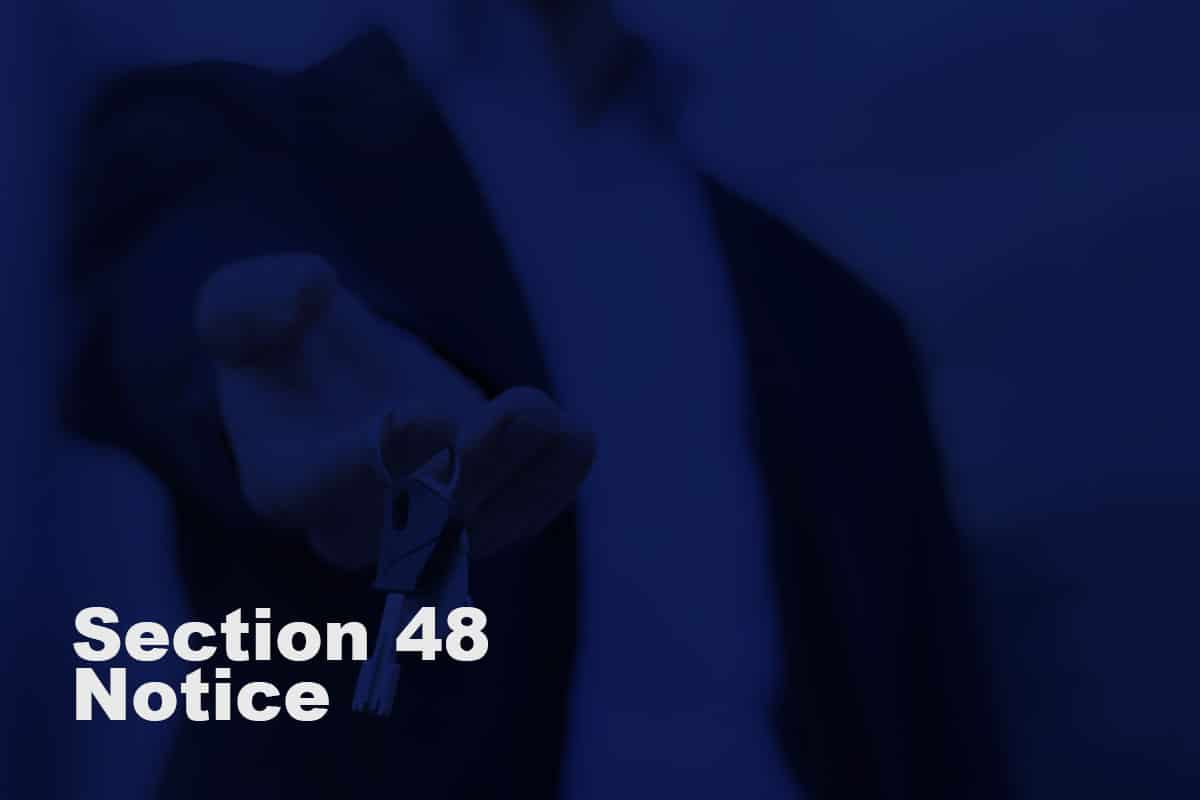The Section 48 Notice: A Detailed Exploration for Landlords and Tenants

-
by Robert Jones, Founder of Property Investments UK
With two decades in UK property, Rob has been investing in buy-to-let since 2005, and uses property data to develop tools for property market analysis.
Navigating the complexities of landlord-tenant laws can be a daunting task for both parties involved. One such critical aspect is the Section 48 Notice, a legal requirement under the Landlord and Tenant Act 1987. This notice plays a pivotal role in safeguarding the rights of tenants and outlining the responsibilities of landlords.
In this guide, we delve into the intricacies of the Section 48 Notice, exploring its purpose, when and how it should be served, and the potential legal implications of non-compliance. Whether you're a landlord seeking to understand your obligations or a tenant wanting to know your rights, this article aims to demystify the Section 48 Notice, providing you with the knowledge you need to ensure a smooth and lawful tenancy.
Introduction
The Section 48 Notice, a crucial legal requirement under the Landlord and Tenant Act 1987 serves as a protective measure for tenants and a responsibility for landlords. This notice ensures that tenants are aware of an address in England or Wales where they can serve notices to (have written communication with) their landlord.
In simple terms, there is a legal requirement for tenants to have a postal address, through which their landlord can be reached.
What is a Section 48 Notice?
Applicable in England and Wales, a Section 48 Notice is a legal requirement that mandates landlords to provide their tenants with an address where they can serve notices. This address can be the landlord's home address, the address of a managing agent, or a solicitor's office. The key points are: that it must be a physical address and not a PO Box or email address. And it must be an address located in England or Wales.
The purpose of the Section 48 Notice is to protect tenants by ensuring they have a valid address to serve legal notices to their landlords. An example of such a legal notice could be a tenant writing to a landlord to insist that repairs be done that are the landlord's legal responsibility.
The text of the legislation (Section 48 of the Landlord and Tenant Act) is as follows:
- A landlord of premises to which this Part applies shall by notice furnish the tenant with an address in England and Wales at which notices (including notices in proceedings) may be served on him by the tenant.
- Where a landlord of any such premises fails to comply with subsection (1), any rent [service charge or administration charge] otherwise due from the tenant to the landlord shall (subject to subsection (3)) be treated for all purposes as not being due from the tenant to the landlord at any time before the landlord does comply with that subsection.
- Any such rent [service charge or administration charge] shall not be so treated in relation to any time when, by virtue of an order of any court [or tribunal], there is in force an appointment of a receiver or manager whose functions include the receiving of rent [service charges or (as the case may be) administration charges] from the tenant.

Access our selection of exclusive, high-yielding, off-market property deals and a personal consultant to guide you through your options.
When is a Section 48 Notice Required?
A Section 48 Notice is required at the commencement of any tenancy. The landlord must serve this notice to the tenant as soon as the tenancy begins. If the landlord fails to serve a Section 48 Notice, the tenant is legally within their rights to withhold rent until they receive it.
It's important to note that the tenant is not absolved of their obligation to pay rent; they are merely allowed to withhold it until they receive the Section 48 Notice containing the necessary postal address. Once the notice is received, the tenant must pay all the rent that has been withheld.
Also, should the landlord change their contact address, they must issue a new Section 48 Notice immediately to inform the tenant of the change. Again, if this is not done, the tenant can legally withhold rent until the matter is rectified.
How to Serve a Section 48 Notice
Serving a Section 48 Notice is a straightforward process. The notice must be in writing and must provide an address in England or Wales where the tenant can serve notices to the landlord. The notice can be delivered by hand, sent by post to the tenant's property or more simply contained within the tenancy agreement.
It's crucial for landlords to keep a record of serving the notice, as they may need to prove this in court if a dispute arises. This could be a copy of the notice and proof of postage, or a signed and dated receipt from the tenant acknowledging they received the notice.
It is not necessarily a good idea to send such a notice by recorded delivery as the tenant may not receive it or they may refuse to sign for it. It is best to get a signature from the tenant to confirm that they have received it.

The Legal Implications
The legal implications of the Section 48 Notice are significant and can have serious consequences for landlords who fail to comply. One of the primary legal implications is related to rent payments. If a landlord fails to serve a Section 48 Notice, the tenant is legally entitled to withhold rent until they receive the notice.
Again, it's important that any tenant who is withholding rent understands that the rent is not waived; it is merely withheld and must be paid in full once the notice is received.
Another legal implication is that any legal proceedings initiated by the tenant must be served to the address provided in the Section 48 Notice. If the landlord fails to provide an address or provides an incorrect address, they may not receive important legal documents, which could lead to unfavourable judgments in their absence.
Common Mistakes to Avoid
When dealing with Section 48 Notices, landlords often make a few common mistakes that can lead to legal complications. One of the most common mistakes is providing incorrect information on the notice. The address provided must be a physical address in England or Wales where the tenant can serve notices. Providing a PO Box or an email address is not acceptable.
Another common mistake is failing to serve a new Section 48 Notice when the landlord's address changes. If the landlord moves or decides to use a different address for receiving notices, they must serve a new Section 48 Notice to the tenant with the updated address. Failure to do so can lead to the same consequences as not serving the notice in the first place.
As the address does not have to be the landlord's home address, this sometimes leads to problems as well. Often, landlords will use the address of the letting agent or their solicitor and then not think too much of it, to the degree that when they change their letting agent or representative, the contact address for the tenant is forgotten about and not updated. This is all so easy to do, especially when most modern communication is done by email.
FAQ
Q: Can a tenant withhold rent if they have not received a Section 48 Notice?
A: Yes, a tenant can legally withhold rent until they receive a Section 48 Notice from their landlord. However, the rent is not waived and must be paid in full once the notice is received.
Q: What address can a landlord provide in a Section 48 Notice?
A: The address provided in a Section 48 Notice must be a physical address in England or Wales. This can be the landlord's home address, the address of a managing agent, or a solicitor's office. A PO Box or email address is not acceptable.
Q: What happens if a landlord's address changes after serving a Section 48 Notice?
A: If a landlord's address changes after serving a Section 48 Notice, they must serve a new notice to the tenant with the updated address. Failure to do so can lead to the tenant legally withholding rent.
Conclusion
Understanding the Section 48 Notice is crucial for both landlords and tenants. For landlords, it's a legal obligation that, if overlooked, can lead to serious consequences such as tenants withholding rent. For tenants, it's a protective measure that ensures they have a valid address to serve notices to their landlords.
As with any legal matter, it's always recommended to seek professional advice to ensure compliance with all legal requirements. The Section 48 Notice is a key part of the landlord-tenant relationship and plays a significant role in ensuring smooth and lawful tenancies.
